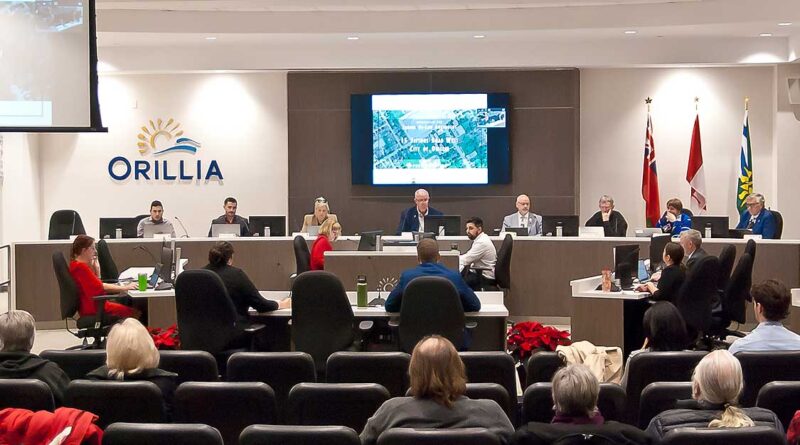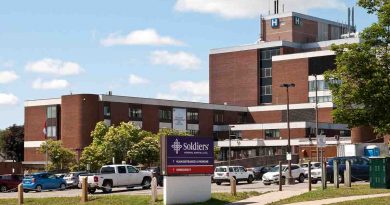Council Preview / 2026 Operating Budget
By John Swartz
Orillia council has a budget meeting Wednesday, November 12 at 9 a.m. to discuss amendments to the operating budget proposed under the new procedure resulting from the City gaining strong mayor powers. The budget used to be drafted kind of as a wish list (with some direction from council) and hacked away at by council over three weeks of meetings. Now it’s considered a proposal by the mayor (who has more control over what is in it) to council and council’s ability to make changes is limited. The entire operating budget was discussed October 27.
There are 7 amendments being proposed at this meeting. First on the list is one by councillor Tim Lauer to raise the reserve contribution from the tax levy by $700K or 1% (there is no reference to which ever is greater or lesser). The proposal from October showed a $1.5 million contribution, but pages later it also showed a reduction of $747K.
Staff said they were changing the method of contributions because the 10-year-capital plan funding projection did not include money put back into reserves unspent of various completed projects. In September there was a report saying $7.5 million was unspent from finished capital projects.
Council had decided they wanted to increase the current year capital reserve contribution from the tax levy of 2.98% every year to chip away at a projected shortfall of identified funding for projects in the ten-year plan.
By taking into account capital surpluses each year, which had not been part of the ongoing funding calculations, staff argued it wasn’t necessary to hit the tax levy for reserve contributions in the amount council wanted. Instead they say the levy could be only 1% this year and go up buy .3% each year until becoming a 3.72% levy charge by 2036 to achieve the same goal if capital project surpluses are taken into account. This assumes there will be surpluses each year.
Lauer contends it still leaves a funding shortfall and wants to essentially wipe out the $700K reduction. In the notes for the amendment Lauer refers to road and sidewalk replacement as a target for increasing the budget.
Staff comment to the amendment is that either way works and achieves the same goal, except staff’s method eases levy increases over ten years, while Lauer’s puts the load up front.
Housing
Councillor Jay Fallis has an amendment to restore contributions to the affordable housing reserve in the amount of $300K. The amendment states the annual contribution, which Fallis notes has been greater than $300K, was removed from the budget. The account has a current balance of $408K. He also notes there is a 100+ unit proposal made this year.
He states the reliance on the federal CMHC housing accelerator funding the City gets to replace contributions to the City’s reserve should not be counted on because the funding will end in a few years and there is no guarantee full funding will be given. Additionally for developers to get the maximum grants for their projects the amount of municipal partnership counts and if there is no money in the reserve to grant to projects developers may get less from the feds.
Fallis says the amount could come from the tax rate stabilization reserve, instead of the tax levy to restore the contribution.
Staff is not onside, essentially saying funding affordable housing in not Orillia’s problem but a provincial and federal responsibility. In a way they are right, Orillia did not create the problem, provincial and federal policy did. Municipalities are being left to mitigate with fewer resources and no ability to make other systemic changes to reduce homelessness and housing prices.
Staff also note the money in reserves never really leaves the City, but is used to transfer to other departments to cover things like permit costs. They also note the province gave developers of affordable housing a development charge holiday (which means property tax payers will be on the hook for local improvement needed because of development) implying there are enough incentives.
Garbage Out
Councillor Dave Campbell wants $275K restored to the budget for blue box recycling collection for industrial, commercial and institutional tax payers. To say the province is screwing up recyclable collection is understatement. Starting in 2026 municipalities are no long required to pick up from businesses. The province in a Pollyanna mood believes businesses will pay for their own collection service of their own accord.
Sure they do pay now, but it is part of their property tax bill and difficult to dispense with the expense of carting away recyclables. You can bet some businesses will just try to load up regular garbage collection with recyclables; that won’t work for long with clear garbage bags and the City will still have to spend money chasing down businesses that don’t believe they have to play along. That means recyclables will be disappearing in the night to somewhere as sure as people keep finding garbage dumped in county forests and along rural roads.
Staff say it costs $98 per stop, while industrial, commercial and institutional costs are $698 per stop. This, frankly, looks like someone used a broken calculator and if that is the cost it would be nice to have a breakdown of how that is the case.
Make The Bed
Councillor Janet-Lynne Durnford has an amendment to provide a $100K grant to Green Haven Shelter for Women and Children. Representatives of the shelter had a deputation at the last council meeting asking for that amount to fund a transitional bed pilot program which began in May. This program is designed to provide temporary housing for 6 months to a person in need, which includes programs to help women line up alternative funding, find permanent housing and navigate government services.
There was $71K in last year’s budget granted to Green Haven, but this year’s budget removed that grant shutting Green Haven out completely from municipal support. The province funds 60% of Green Haven’s $1.5 million budget.
Staff’s comment leads off with, “Are property taxes meant to further charitable initiatives?” which is an interesting take. There always seem to be money to fund parking for sports tournaments.
Two more questions follow:
“If the provincial ministry that provides funding and oversight does not consider this to be an eligible expenditure, what legitimate municipal purpose will be met by this donation of the property tax dollars?
“Is the inclusion of transitional housing an indicator of scope creep for Green Haven?”
These sound pretty callous in light of a major problem in our midst that only exists because of significant failure of policy at all levels of government, and a failure of society to raise our children properly.
The questions show a libertarian approach to tending segments of society in need, who needs empathy? And someone else can pick up the slack. Orillia taxpayers are the neighbours of these victims and it seems like it would be more beneficial to argue in favour of helping our neighbours.
Library
Durnford also has an amendment to increase the budget allocation to the Orillia Public Library by $64K. The library needs a $126K budget increase to keep service levels equal to 2025, but the mayor’s budget only increased the budget by $62K. At that amount, hours and staff will have to be cut.
Staff comment points out the failures of other communities to provide adequate library service (funding and staffing) as the stick to measure the library service Orillia has. With all their crunching as to cost and staffing, they fail to give ink to how many users (how many people go into the library each day compared to the other communities) or what kind of service other municipalities have in comparing cost per capita.
They also point out 37% of users they can count (i.e. library cardholders) do not live in the City. This ignores that year after year council asks Severn, and Oro-Medonte to contribute proportionally to the budget according to the percentage of users from those areas, but then does nothing to change the case. Instead they leave it up to the library board, which has a twig instead of stick to make their point to the other councils when the City could be doing something more. It also ignores the Library Act and the flaws contained regarding funding – like for example, the pitifully low amount the province grants to all libraries. Since Severn has a library, they could technically and legally send no money to Orillia; Oro-Medonte splits their library funding among 5 libraries in municipalities they have as neighbours. There is nothing in the Act preventing anyone from using any library in the province for free (basic) services.
Then staff go on to paint the picture of how much Orillia tax payers are subsidizing township users – they say up to 10 times per capita. This shifts the conversation from counting actual property taxpayers to counting every person in the city, which is not the same number. And then they make the comparison using library cardholder figures, which results in a higher cost per. This does not recognize library use is to be free. It is not necessary to have a library card to use library services (it is to take out material).
Taking this logic further, we should start charging outside residents to use our roads, walk on our sidewalks, shop at our stores, use our parks and add a surcharge for tickets to Opera House events.
The Act states every municipality must provide a library, or pay for library use if they don’t the bricks in place. We have the library citizens want, and in a community with the lowest average incomes, needs. Having the amount of staff is a reflection of what the people have asked for in terms of service. Being open Sunday is a service people asked for and use. A dictionary that only has definitions up to the letter Q is useless, a library that does not provide what people ask for is too.
It’s Snowing
Councillor Fallis has another amendment to add $150K to the winter control budget for contractors in case of unanticipated needs such as equipment breakdowns, more snow, etc. Fallis is suggesting the funding source be from reserves instead of the tax levy. The money may never be spent and this budget item means staff would not have to come to council for approval to spend money not in the budget at a time when it’s needed.
Staff say coming to council for additional emergency budget helps to keep council informed about real conditions and allows council to make policy adjustments if staff have to keep coming back because the weather is out of control.
Staff also say the purchasing by-law allows staff to make emergency purchases. So this amendment may not be absolutely necessary.
More Info Please
Councillor Lauer has a motion to remove $25K from the budget earmarked for Information Orillia. This is in anticipation council has already approved the amount following the November 3 meeting.
Ooo-Ooo That Smell
Councillor Fallis has the last amendment to include $35K for a sewage backflow rebate pilot program. This proposal is for 2026 only.
Staff say the City is not responsible for what happens to individual tax payers when sewage backs up. Technically they are not. But has anyone ever heard of just one house in a neighbourhood getting flooded by sewage? Cities typically wash their hands of responsibility for sewage system failures (of which there were a few because of the ice storm).
Tax payers would have to apply for a rebate of part of their costs to install equipment to prevent backflows of their neighbour’s sewage. It’s possible the money will never get used. This does not recognize systemic failures are the cause of problems and the system is constructed and owned by the municipality. things break and an ounce of prevention seems to be prudent.
In total, staff say if all amendments pass it will add $1.4 million to the budget, making the total budget increase over 2025 $2.6 million for an increase in tax bills of 3.38%.
Council meetings are open to the public or can be watched on the City’s Youtube channel.
(Photos by Swartz – SUNonline/Orillia)




